Business Law Assignment: Contract, Consumer Law, and Remedies Analysis
VerifiedAdded on 2023/03/20
|6
|1391
|50
Homework Assignment
AI Summary
This Business Law assignment addresses a scenario involving a contract between Vincenzo and Scenic View hotel. The assignment analyzes the formation of the contract, including offer, acceptance, intention, capacity, and consideration. It examines whether the contract can be repudiated due to breach, specifically concerning misrepresentation and failure to provide the advertised services. The assignment also differentiates between contract terms and representations, and the significance of collateral contracts, conditions, and warranties. Furthermore, it explores consumer law, focusing on the Australian Consumer Law, consumer guarantees, and the implications of exclusion clauses. Vincenzo, as a consumer, is entitled to services of acceptable quality, and the denial of a refund violates the consumer guarantees. The assignment concludes by providing a remedy for Vincenzo to claim damages and repudiate the contract.
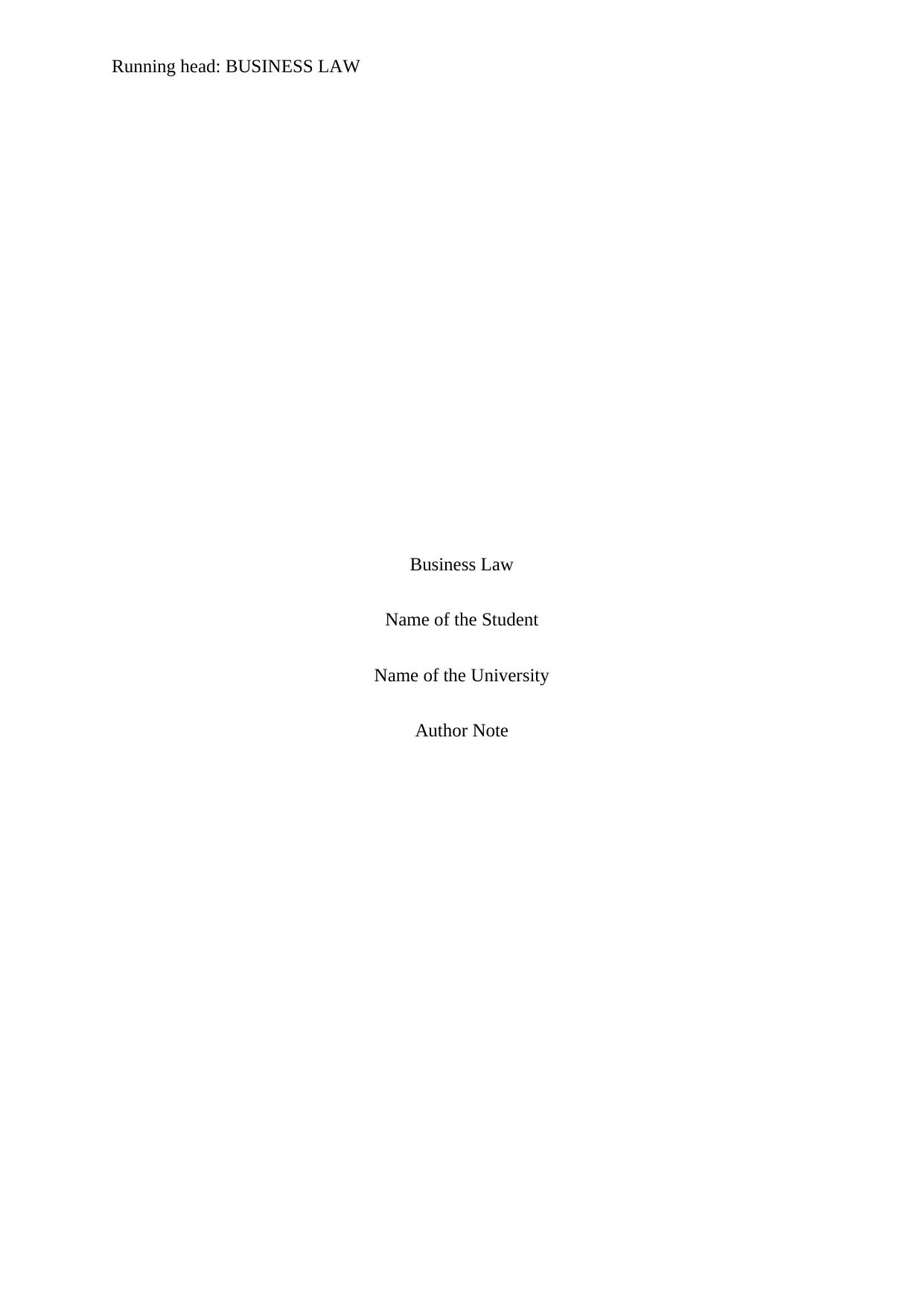
Running head: BUSINESS LAW
Business Law
Name of the Student
Name of the University
Author Note
Business Law
Name of the Student
Name of the University
Author Note
Paraphrase This Document
Need a fresh take? Get an instant paraphrase of this document with our AI Paraphraser
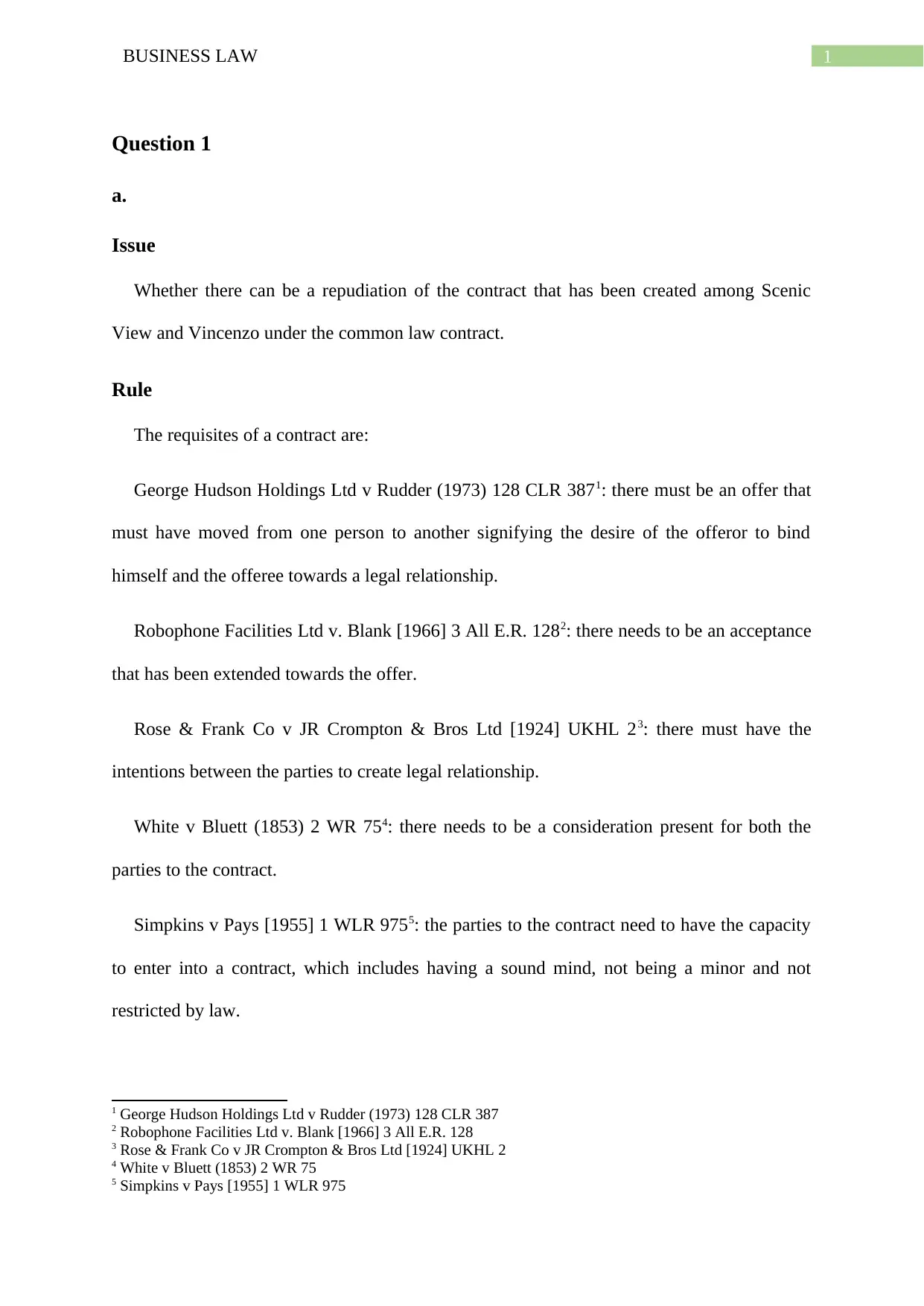
1BUSINESS LAW
Question 1
a.
Issue
Whether there can be a repudiation of the contract that has been created among Scenic
View and Vincenzo under the common law contract.
Rule
The requisites of a contract are:
George Hudson Holdings Ltd v Rudder (1973) 128 CLR 3871: there must be an offer that
must have moved from one person to another signifying the desire of the offeror to bind
himself and the offeree towards a legal relationship.
Robophone Facilities Ltd v. Blank [1966] 3 All E.R. 1282: there needs to be an acceptance
that has been extended towards the offer.
Rose & Frank Co v JR Crompton & Bros Ltd [1924] UKHL 23: there must have the
intentions between the parties to create legal relationship.
White v Bluett (1853) 2 WR 754: there needs to be a consideration present for both the
parties to the contract.
Simpkins v Pays [1955] 1 WLR 9755: the parties to the contract need to have the capacity
to enter into a contract, which includes having a sound mind, not being a minor and not
restricted by law.
1 George Hudson Holdings Ltd v Rudder (1973) 128 CLR 387
2 Robophone Facilities Ltd v. Blank [1966] 3 All E.R. 128
3 Rose & Frank Co v JR Crompton & Bros Ltd [1924] UKHL 2
4 White v Bluett (1853) 2 WR 75
5 Simpkins v Pays [1955] 1 WLR 975
Question 1
a.
Issue
Whether there can be a repudiation of the contract that has been created among Scenic
View and Vincenzo under the common law contract.
Rule
The requisites of a contract are:
George Hudson Holdings Ltd v Rudder (1973) 128 CLR 3871: there must be an offer that
must have moved from one person to another signifying the desire of the offeror to bind
himself and the offeree towards a legal relationship.
Robophone Facilities Ltd v. Blank [1966] 3 All E.R. 1282: there needs to be an acceptance
that has been extended towards the offer.
Rose & Frank Co v JR Crompton & Bros Ltd [1924] UKHL 23: there must have the
intentions between the parties to create legal relationship.
White v Bluett (1853) 2 WR 754: there needs to be a consideration present for both the
parties to the contract.
Simpkins v Pays [1955] 1 WLR 9755: the parties to the contract need to have the capacity
to enter into a contract, which includes having a sound mind, not being a minor and not
restricted by law.
1 George Hudson Holdings Ltd v Rudder (1973) 128 CLR 387
2 Robophone Facilities Ltd v. Blank [1966] 3 All E.R. 128
3 Rose & Frank Co v JR Crompton & Bros Ltd [1924] UKHL 2
4 White v Bluett (1853) 2 WR 75
5 Simpkins v Pays [1955] 1 WLR 975

2BUSINESS LAW
Johnson v Buttress [1936] HCA 416: the consent of the parties to the contract needs to be
free from mistake, duress, unconscionability, undue influence and misrepresentation.
Cutter v Powell [1795] EWHC KB J137: a contract can be terminated by way of
performance, discharge, frustration, mutual agreement and breach.
Addis v Gramophone [1909] AC 4888: damages can be claimed by the aggrieved in case
of breach of the contract and the amount of damages will be same as that of the loss caused.
Other remedies available are recession, injunction and specific performance.
Application
Elements of contract between Vincenzo and scenic beauty has been satisfied. Offer to sell
services by the hotel has been accepted by Vincenzo. As it is a commercial agreement, the
intention to create legal relationship was also present. Capacity of the parties are also there.
However, there was not proper understanding between the two as Vincenzo has a week
English. The services rendered by the hotel were not acceptable and hence was a breach of
contract. Hence, contract can be repudiated. Vincenzo can claim a full refund.
Conclusion
There can be a repudiation of the contract that has been created among Scenic View and
Vincenzo under the common law contract.
b.
Issue
Differentiation between term of a contract and representation. Importance of a collateral
contract. Differentiation between conditions and warranties.
6 Johnson v Buttress [1936] HCA 41
7 Cutter v Powell [1795] EWHC KB J13
8 Addis v Gramophone [1909] AC 488
Johnson v Buttress [1936] HCA 416: the consent of the parties to the contract needs to be
free from mistake, duress, unconscionability, undue influence and misrepresentation.
Cutter v Powell [1795] EWHC KB J137: a contract can be terminated by way of
performance, discharge, frustration, mutual agreement and breach.
Addis v Gramophone [1909] AC 4888: damages can be claimed by the aggrieved in case
of breach of the contract and the amount of damages will be same as that of the loss caused.
Other remedies available are recession, injunction and specific performance.
Application
Elements of contract between Vincenzo and scenic beauty has been satisfied. Offer to sell
services by the hotel has been accepted by Vincenzo. As it is a commercial agreement, the
intention to create legal relationship was also present. Capacity of the parties are also there.
However, there was not proper understanding between the two as Vincenzo has a week
English. The services rendered by the hotel were not acceptable and hence was a breach of
contract. Hence, contract can be repudiated. Vincenzo can claim a full refund.
Conclusion
There can be a repudiation of the contract that has been created among Scenic View and
Vincenzo under the common law contract.
b.
Issue
Differentiation between term of a contract and representation. Importance of a collateral
contract. Differentiation between conditions and warranties.
6 Johnson v Buttress [1936] HCA 41
7 Cutter v Powell [1795] EWHC KB J13
8 Addis v Gramophone [1909] AC 488
⊘ This is a preview!⊘
Do you want full access?
Subscribe today to unlock all pages.

Trusted by 1+ million students worldwide
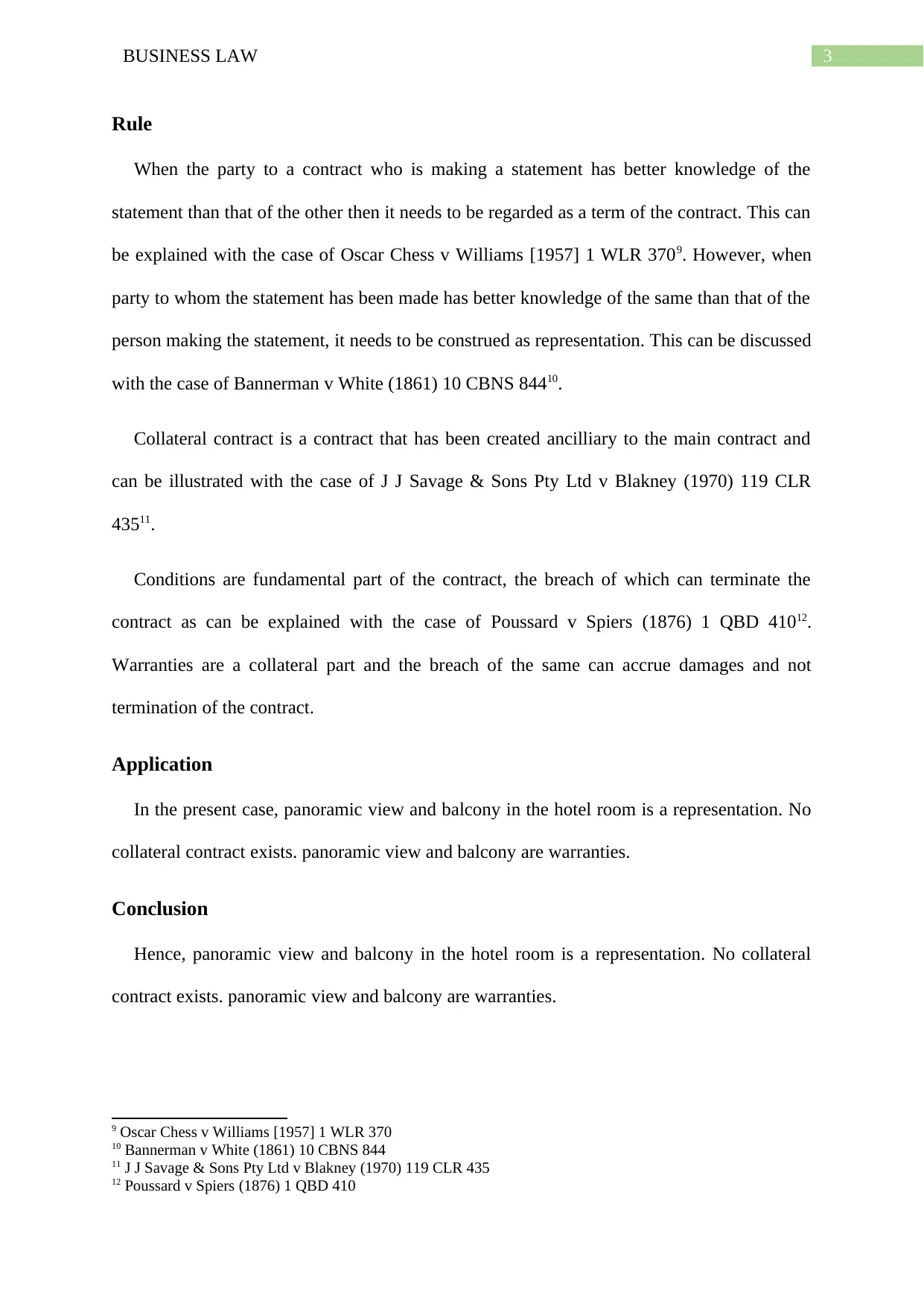
3BUSINESS LAW
Rule
When the party to a contract who is making a statement has better knowledge of the
statement than that of the other then it needs to be regarded as a term of the contract. This can
be explained with the case of Oscar Chess v Williams [1957] 1 WLR 3709. However, when
party to whom the statement has been made has better knowledge of the same than that of the
person making the statement, it needs to be construed as representation. This can be discussed
with the case of Bannerman v White (1861) 10 CBNS 84410.
Collateral contract is a contract that has been created ancilliary to the main contract and
can be illustrated with the case of J J Savage & Sons Pty Ltd v Blakney (1970) 119 CLR
43511.
Conditions are fundamental part of the contract, the breach of which can terminate the
contract as can be explained with the case of Poussard v Spiers (1876) 1 QBD 41012.
Warranties are a collateral part and the breach of the same can accrue damages and not
termination of the contract.
Application
In the present case, panoramic view and balcony in the hotel room is a representation. No
collateral contract exists. panoramic view and balcony are warranties.
Conclusion
Hence, panoramic view and balcony in the hotel room is a representation. No collateral
contract exists. panoramic view and balcony are warranties.
9 Oscar Chess v Williams [1957] 1 WLR 370
10 Bannerman v White (1861) 10 CBNS 844
11 J J Savage & Sons Pty Ltd v Blakney (1970) 119 CLR 435
12 Poussard v Spiers (1876) 1 QBD 410
Rule
When the party to a contract who is making a statement has better knowledge of the
statement than that of the other then it needs to be regarded as a term of the contract. This can
be explained with the case of Oscar Chess v Williams [1957] 1 WLR 3709. However, when
party to whom the statement has been made has better knowledge of the same than that of the
person making the statement, it needs to be construed as representation. This can be discussed
with the case of Bannerman v White (1861) 10 CBNS 84410.
Collateral contract is a contract that has been created ancilliary to the main contract and
can be illustrated with the case of J J Savage & Sons Pty Ltd v Blakney (1970) 119 CLR
43511.
Conditions are fundamental part of the contract, the breach of which can terminate the
contract as can be explained with the case of Poussard v Spiers (1876) 1 QBD 41012.
Warranties are a collateral part and the breach of the same can accrue damages and not
termination of the contract.
Application
In the present case, panoramic view and balcony in the hotel room is a representation. No
collateral contract exists. panoramic view and balcony are warranties.
Conclusion
Hence, panoramic view and balcony in the hotel room is a representation. No collateral
contract exists. panoramic view and balcony are warranties.
9 Oscar Chess v Williams [1957] 1 WLR 370
10 Bannerman v White (1861) 10 CBNS 844
11 J J Savage & Sons Pty Ltd v Blakney (1970) 119 CLR 435
12 Poussard v Spiers (1876) 1 QBD 410
Paraphrase This Document
Need a fresh take? Get an instant paraphrase of this document with our AI Paraphraser
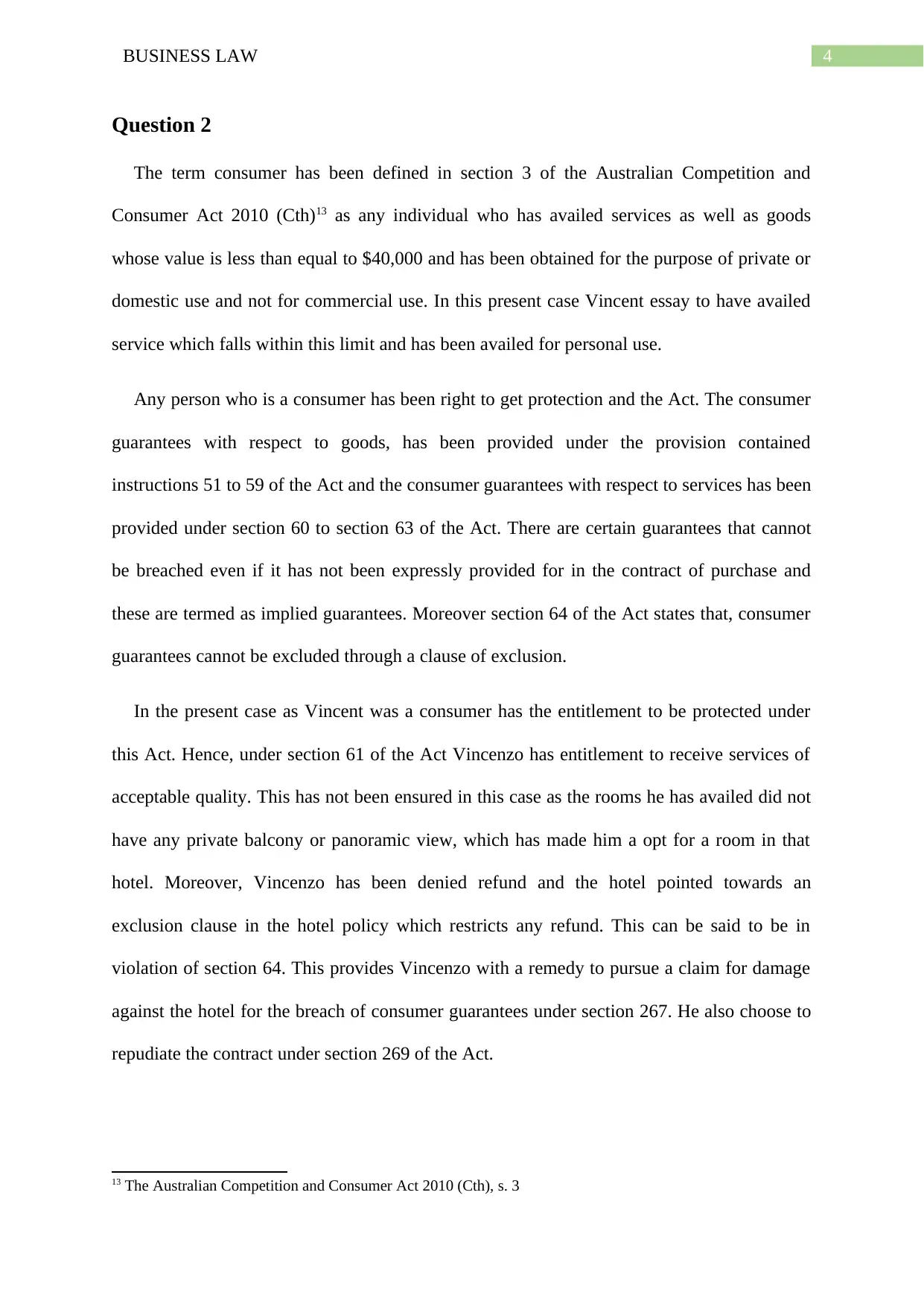
4BUSINESS LAW
Question 2
The term consumer has been defined in section 3 of the Australian Competition and
Consumer Act 2010 (Cth)13 as any individual who has availed services as well as goods
whose value is less than equal to $40,000 and has been obtained for the purpose of private or
domestic use and not for commercial use. In this present case Vincent essay to have availed
service which falls within this limit and has been availed for personal use.
Any person who is a consumer has been right to get protection and the Act. The consumer
guarantees with respect to goods, has been provided under the provision contained
instructions 51 to 59 of the Act and the consumer guarantees with respect to services has been
provided under section 60 to section 63 of the Act. There are certain guarantees that cannot
be breached even if it has not been expressly provided for in the contract of purchase and
these are termed as implied guarantees. Moreover section 64 of the Act states that, consumer
guarantees cannot be excluded through a clause of exclusion.
In the present case as Vincent was a consumer has the entitlement to be protected under
this Act. Hence, under section 61 of the Act Vincenzo has entitlement to receive services of
acceptable quality. This has not been ensured in this case as the rooms he has availed did not
have any private balcony or panoramic view, which has made him a opt for a room in that
hotel. Moreover, Vincenzo has been denied refund and the hotel pointed towards an
exclusion clause in the hotel policy which restricts any refund. This can be said to be in
violation of section 64. This provides Vincenzo with a remedy to pursue a claim for damage
against the hotel for the breach of consumer guarantees under section 267. He also choose to
repudiate the contract under section 269 of the Act.
13 The Australian Competition and Consumer Act 2010 (Cth), s. 3
Question 2
The term consumer has been defined in section 3 of the Australian Competition and
Consumer Act 2010 (Cth)13 as any individual who has availed services as well as goods
whose value is less than equal to $40,000 and has been obtained for the purpose of private or
domestic use and not for commercial use. In this present case Vincent essay to have availed
service which falls within this limit and has been availed for personal use.
Any person who is a consumer has been right to get protection and the Act. The consumer
guarantees with respect to goods, has been provided under the provision contained
instructions 51 to 59 of the Act and the consumer guarantees with respect to services has been
provided under section 60 to section 63 of the Act. There are certain guarantees that cannot
be breached even if it has not been expressly provided for in the contract of purchase and
these are termed as implied guarantees. Moreover section 64 of the Act states that, consumer
guarantees cannot be excluded through a clause of exclusion.
In the present case as Vincent was a consumer has the entitlement to be protected under
this Act. Hence, under section 61 of the Act Vincenzo has entitlement to receive services of
acceptable quality. This has not been ensured in this case as the rooms he has availed did not
have any private balcony or panoramic view, which has made him a opt for a room in that
hotel. Moreover, Vincenzo has been denied refund and the hotel pointed towards an
exclusion clause in the hotel policy which restricts any refund. This can be said to be in
violation of section 64. This provides Vincenzo with a remedy to pursue a claim for damage
against the hotel for the breach of consumer guarantees under section 267. He also choose to
repudiate the contract under section 269 of the Act.
13 The Australian Competition and Consumer Act 2010 (Cth), s. 3
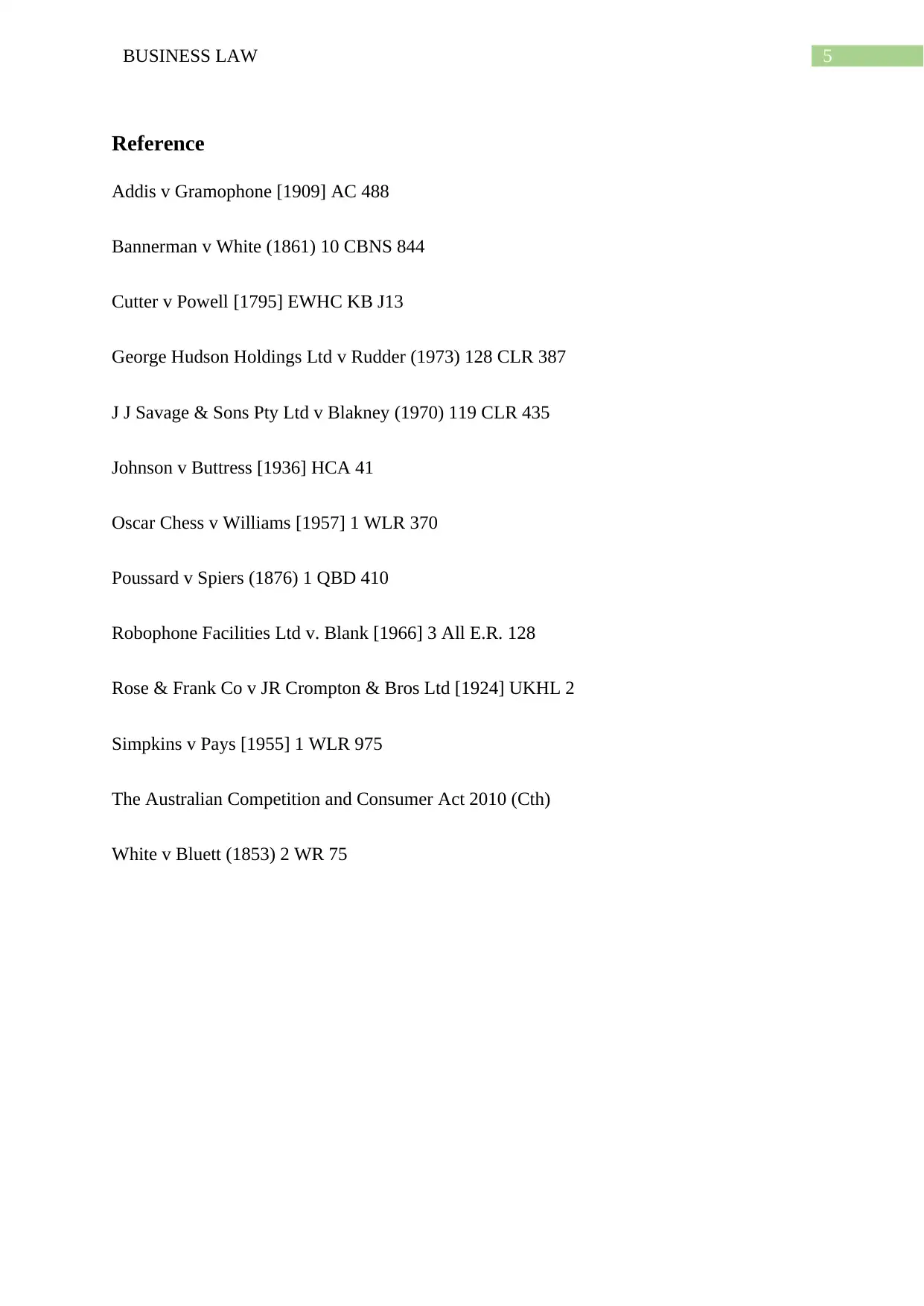
5BUSINESS LAW
Reference
Addis v Gramophone [1909] AC 488
Bannerman v White (1861) 10 CBNS 844
Cutter v Powell [1795] EWHC KB J13
George Hudson Holdings Ltd v Rudder (1973) 128 CLR 387
J J Savage & Sons Pty Ltd v Blakney (1970) 119 CLR 435
Johnson v Buttress [1936] HCA 41
Oscar Chess v Williams [1957] 1 WLR 370
Poussard v Spiers (1876) 1 QBD 410
Robophone Facilities Ltd v. Blank [1966] 3 All E.R. 128
Rose & Frank Co v JR Crompton & Bros Ltd [1924] UKHL 2
Simpkins v Pays [1955] 1 WLR 975
The Australian Competition and Consumer Act 2010 (Cth)
White v Bluett (1853) 2 WR 75
Reference
Addis v Gramophone [1909] AC 488
Bannerman v White (1861) 10 CBNS 844
Cutter v Powell [1795] EWHC KB J13
George Hudson Holdings Ltd v Rudder (1973) 128 CLR 387
J J Savage & Sons Pty Ltd v Blakney (1970) 119 CLR 435
Johnson v Buttress [1936] HCA 41
Oscar Chess v Williams [1957] 1 WLR 370
Poussard v Spiers (1876) 1 QBD 410
Robophone Facilities Ltd v. Blank [1966] 3 All E.R. 128
Rose & Frank Co v JR Crompton & Bros Ltd [1924] UKHL 2
Simpkins v Pays [1955] 1 WLR 975
The Australian Competition and Consumer Act 2010 (Cth)
White v Bluett (1853) 2 WR 75
⊘ This is a preview!⊘
Do you want full access?
Subscribe today to unlock all pages.

Trusted by 1+ million students worldwide
1 out of 6
Your All-in-One AI-Powered Toolkit for Academic Success.
+13062052269
info@desklib.com
Available 24*7 on WhatsApp / Email
![[object Object]](/_next/static/media/star-bottom.7253800d.svg)
Unlock your academic potential
Copyright © 2020–2026 A2Z Services. All Rights Reserved. Developed and managed by ZUCOL.
